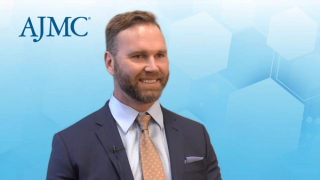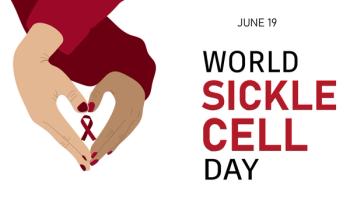
Health Care Cost
Latest News

Patients With ADAMTS13 Deficiency and/or TTP Experience High Clinical Burden
Latest Videos

CME Content
More News

CMS recently launched a voluntary, nationwide dementia care program; the number of physicians who reported at least 1 symptom of burnout has dropped below 50% for the first time since the onset of the COVID-19 pandemic; diabetes drugs have all been in short supply over the last 18 months, partly due to people using them off label for weight loss.

A long-awaited report from the Federal Trade Commission (FTC) finds that vertical integration and consolidation have worked against consumers and independent pharmacies.

AJMC's Center on Health Equity & Access shares new developments in HIV treatment, gynecological and multidisciplinary cancer care, and health care barriers faced by older Americans.

Investigators compared cost-effectiveness of the KRAS inhibitor sotorasib against the taxane docetaxel in the second line for non–small cell lung cancer (NSCLC).

Crystal S. Denlinger, MD, FACP, CEO of the National Comprehensive Cancer Network, breaks down the causes of the ongoing cancer drug shortage, as well as its impact on clinical trials.

Sindhuja Kadambi, MD, MS, University of Rochester Medical Center, discussed in detail the unique considerations necessary for oncology care in the aging population.

Insurers continue to raise consumer costs despite covering fewer drugs and having more drug coverage restrictions; the Biden Administration is investing hundreds of millions of dollars to train geriatricians; the Federal Trade Commission has opened an investigation into Teva Pharmaceuticals after the company refused to take down patents for its asthma and chronic obstructive pulmonary disease inhalers.

Charlie Borowicz, manager of trans and gender diverse health at Allegheny Health Network, shares how the program offers comprehensive patient-first care to those in the LGBTQ+ and gender diverse community.

This new report reveals that the US has made minimal progress in advancing health care equity over the past 2 decades.

The use of Plan B fell by 60% in states that implemented near-total abortion bans after Roe v. Wade was overturned; the Biden administration will impose inflation penalties on 64 prescription drugs in the third quarter of 2024; the FDA recently released draft guidance to ensure that drug companies and medical device makers enroll more women and people of color in clinical trials.

On this episode of Managed Care Cast, we're talking with the author of a study published in the June 2024 issue of The American Journal of Managed Care® about how annual high-deductible insurance plans increase maternity care costs when pregnancies cross 2 calendar years.

What We’re Reading: Surging Global Dengue Cases; EHR Blocking Ban Finalized; Weight-Loss Drug Access
The CDC issued a warning to doctors on Tuesday to look out for dengue cases amid a global surge; HHS has finalized disincentives to prevent health care organizations from unreasonably blocking the exchange of electronic health record (EHR) information; patients in some states, like West Virginia, cannot afford weight-loss medications due to the high costs and lack of insurance coverage.

In our fourth Pride Month podcast episode, we are speaking with Domenico Ruggerio, executive director of We Are Family, in Charleston, South Carolina, the state's oldest nonprofit to provide life-affirming and life-saving programs for lesbian, gay, bisexual, transgender, queer, plus (LGBTQ+) youth.

Beneficiaries who switched from traditional Medicare to a Medicare Advantage plan experienced no additional protection from medical costs compared with those who stayed in a traditional Medicare plan.

A federal appeals court has ruled a key part of the Affordable Care Act (ACA) unconstitutional, which allows a health task force to require insurers to cover preventive health measures without out-of-pocket costs; the FDA’s recent decision to authorize 4 menthol vaping products drew harsh criticism from pediatricians and antitobacco groups; rising health care prices are lowering American wages and causing job losses.

This week, the Center on Health Equity & Access featured expert perspectives on sickle cell disease, obesity, psychological safety, LGBTQ+ health, and postpartum depression.

Health care spending avoided by increased hepatitis C treatment could more than offset direct spending on increased treatment, according to a new report from the Congressional Budget Office (CBO).

Accelerated approval was originally granted in June 2023 for patients aged 4 to 5 years, indicating there was an unmet clinical need for a potentially life-saving treatment for the rare genetic muscle disorder.

The US Preventive Services Task Force recommends that kids 6 years and older with a high body mass index receive intensive behavioral interventions; Amazon’s pharmacy unit is expanding eligibility for RxPass to patients enrolled in Medicare insurance plans; Sen Bernie Sanders (I, Vermont) is trying to lower the prices of popular antiobesity drugs.

The rate of uninsured Americans will rise to 8.9% over the next decade; Senator Bernie Sanders (I, Vermont) wants a government watchdog to investigate why women are still being charged for contraception considered free under federal law, and proposed Medicare Advantage Star Ratings target top performers.

June 19 is marked as World Sickle Cell Awareness Day, granting the opportunity to reflect on the current state of treatment, access, equity, and more that impacts patients living with sickle cell disease.

The home-based care model offers a promising strategy for improving quality of care, while also reducing health care spending.

Over $3 billion in payments were issued to health care providers and suppliers; a recent poll highlights growing demand to alleviate medical debt; preliminary data show a decrease in uninsured individuals since 2019.

Ageing with HIV comes with greater risks of other health complications; behavioral counseling programs for obesity are scare and often not covered by insurance; the surgeon general is calling for legislative action to protect youth when they interact with social media.

Adolescent anterior cruciate ligament reconstruction surgery can preserve health and restore function of the knee joint, but the surgical cost has outpaced inflation.


















